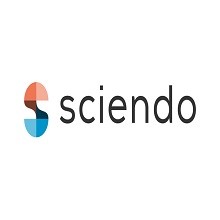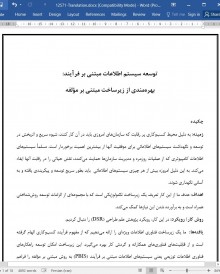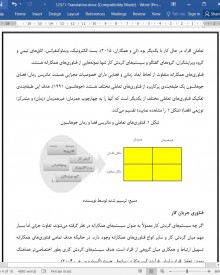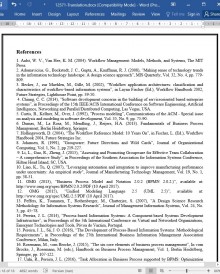
دانلود مقاله توسعه سیستم اطلاعات مبتنی بر فرآیند
چکیده
زمینه: به دلیل محیط کسبوکاری پر رقابت که سازمانهای امروزی باید در آن کار کنند، شیوه سریع و اثربخش در توسعه و نگهداشت سیستمهای اطلاعاتی برای موفقیت آنها از بیشترین اهمیت برخوردار است. مسلماً سیستمهای اطلاعات کامپیوتری که از عملیات روزمره و مدیریت سازمانها حمایت میکنند، نقش حیاتی را در رقابت آنها ایفاء میکند. به این دلیل امروزه بیش از هر چیزی سیستمهای اطلاعاتی باید بطور سریع توسعه و پیکربندی یافته و به آسانی نگهداری شوند.
اهداف: هدف ما از این کار تعریف یک زیرساخت تکنولوژیکی است که با مجموعهای از الزامات توسعه روششناختی همراه است و به برآورده شدن این نیازها کمک میکند.
روش کار/ رویکرد: در این کار، رویکرد پژوهش علم طراحی (DSR) را دنبال کردیم.
یافتهها: ما یک زیرساخت فناوری اطلاعات ویژهای را ارائه میدهیم که از مفهوم فرآیند کسبوکاری الهام گرفته است و از قابلیتهای فناوریهای همکارانه و گردش کار بهره میگیرد. این زیرساخت امکان توسعه راهکارهای فناوری اطلاعات توزیعی یعنی سیستمهای اطلاعات مبتنی بر فرآیند (PBIS) به روش مبتنی بر مؤلفه را فراهم میکند. در رابطه با PBIS مجموعهای از الزامات توسعهای را نیز پیشنهاد میکنیم.
نتیجهگیری: ما ادعا میکنیم که سیستمهای اطلاعات مبتنی بر فرآیند ضمن اینکه تلاش کلی توسعه و نگهداشت سیستمهای اطلاعاتی را ساده میکند، امکان تکامل سریع و هموار در مواجهه با تغییر الزامات کسبوکاری داده و یکپارچگی محصولات IT موجود و آینده را برای سازمانها تسهیل میکند.
مقدمه
بازارهای رقابتی آشفته و در حال افزایش که سازمانهای مدرن باید در آن فعالیت کنند و کسبوکار انجام دهند، به سیستمهای اطلاعات کامپیوتری نیاز دارند که این سیستمها باید از توانمندی توسعه و پیکربندی مجدد سریع و نگهداشت آسان (پریرا، 2014) برخوردار باشند. این کیفیتها پراهمیتترین راهکارهای IT محسوب میشوند و نقش حیاتی را در رقابت سازمانها ایفاء میکنند. در حقیقت همه با این موافق هستند که ما در جامعه متمرکز جهانی و دانشی زندگی میکنیم، سازمان بیش از پیش از لحاظ چابکیشان در واکنش بهنگام و مناسب به فشارهای بازار و فرصتها به رقابت میپردازند (رزمن و وم بروک، 2015). مسلماً سیستمهای اطلاعات کامپیوتری که از عملیات روزمره و مدیریت سازمانها حمایت میکند، نقش حیاتی را در این محیط ایفاء میکنند.
علاوه بر وضعیتهای تقاضای بازار، سازمانها باید با محیط IT پیچیده رو به رشد سروکار داشته باشند که فناوریهای جدید بطور مداوم در این چشمانداز ظهور میکنند. البته، ضروری است که سازمان از امکانات فناوری جدید در امور توسعه سیستم اطلاعات خودشان بطور خلاقانه بهره گیرند تا بتواند رقابت خود را حفظ کنند.
نتیجهگیری
در این مقاله، رویکرد نوآورانهای را برای توسعه سیستمهای اطلاعاتی توضیح دادیم که مفهوم فرآیند کسبوکار رابطه خاصی را بدست آورد. به این راهحل کلی سیستم اطلاعات مبتنی بر فرآیند (PBIS) میگوییم. رویکرد PBIS توسعه افزایشی سیستمهای طلاعاتی را بهبود میبخشد که در این رویکرد راه حل منسجم قطعه به قطعه به شیوهای ماژولار با افزودن مدلهای گردش کار متوالی به سطح هماهنگی و استفاده مجدد یا اگر موجود نباشد با توسعه/ خرید برنامههای کاربردی جدید و امکانات گروه افزار در سطح عملیاتی توسعه داده میشود. در یک دیدگاه کلی، رویکرد PBIS ممکن است به عنوان نوعی از توسعه سیستم اطلاعاتی مبتنی بر مؤلفه (ISD) از طریق مقایسه با توسعه نرمافزار مبتنی بر مؤلفه در حوزه مهندسی نرمافزار درنظر گرفته شود. نوعی از «برنامهنویسی در اندازه وسیع» که مؤلفههای نرمافزاری را تکمیل میکند و با برنامههای کاربردی مستقل یا خودمختار و تسهیلات گروه افزار متناظر است، ترکیب میشوند و براساس خصوصیت فرآیند کسبوکار با یکدیگر کار میکنند.
Abstract
Background: Owing to the highly competitive business environment in which contemporary organizations have to operate, a quick and effective way of developing and maintaining information systems is of utmost importance to their success. Obviously, the computerized information systems that support the everyday operations and management of organizations play a critical role in their competitiveness. For that reason, nowadays, more than ever, information systems have to be quickly developed, rapidly reconfigured, and easily maintained.
Objectives: We aim to define a technological infrastructure, accompanied by a set of methodological development requirements, which might help to fulfil those needs.
Methods/Approach: In this work, we followed a Design Science Research (DSR) approach.
Results: We propose a specific IT infrastructure, inspired by the concept of a business process and using the functionalities provided by collaborative and workflow technologies, which allows the development of distributed IT solutions, Process-Based Information Systems (PBIS), in a componentbased fashion. In the context of PBIS, we also propose a set of development requirements.
Conclusions: We claim that Process-Based Information Systems allow organizations to evolve quickly and smoothly in face of changing business requirements, facilitating the integration of existing and future IT artefacts, while simplifying the overall development and maintenance effort of information systems.
Introduction
The turbulent and increasingly competitive markets in which modern organizations have to operate and do business requires from their computerized information systems the ability of being quickly developed, rapidly reconfigured, and easily maintained (Pereira, 2014). These qualities are of extreme importance as IT solutions play a critical role in the competitiveness of organizations. In fact, everyone agrees that, in the global and knowledge intensive society we live in, organizations compete, more and more, in terms of their agility in reacting timely and adequately to the market pressures and opportunities (Rosemann and vom Brocke, 2015). Obviously, the computerized information systems that support the everyday operations and management of organizations play a critical role in this environment.
In addition to these demanding market conditions, organizations also have to deal with an increasingly complex IT environment, where new technologies are continually appearing on the landscape. Of course, it is necessary that organizations make a creative use of the new technological possibilities in their information systems development efforts, so that they can remain competitive.
Conclusion
In this paper, we describe an innovative approach to the development of Information Systems in which the concept of business process acquires particular relevance. To the overall solution, we call Process-Based Information System (PBIS). The PBIS approach promotes the incremental development of Information Systems, in which the whole solution is developed piece by piece, in a very modular way, by adding successive workflow models to the coordination level, and reusing or, if not available, developing/acquiring new applications and groupware facilities in the operation level. In a general view, the PBIS approach might be regarded as a kind of component-based Information System Development (ISD), by analogy with the component-based software development in the software engineering domain. A kind of “programming in the large”, where complete software components, corresponding to autonomous applications and groupware facilities, are combined and put to work together according to some business process specification.
چکیده
مقدمه
پسزمینه
فناوریهای همکارانه
فناوری جریان کار
سیستمهای مدیریت فرآیند کسبوکار
متدولوژی
یافتهها و بحث
مفهوم سیستم اطلاعات مبتنی بر فرآیند
الزامات توسعه PBIS
نتیجهگیری
منابع
Abstract
Introduction
Background
Collaborative technologies
Workflow technology
Business Process Management Systems
Methodology
Results and Discussion
The Process-Based information System Concept
PBIS Development Requirements
Conclusion
References
- اصل مقاله انگلیسی با فرمت ورد (word) با قابلیت ویرایش
- ترجمه فارسی مقاله با فرمت ورد (word) با قابلیت ویرایش، بدون آرم سایت ای ترجمه
- ترجمه فارسی مقاله با فرمت pdf، بدون آرم سایت ای ترجمه



